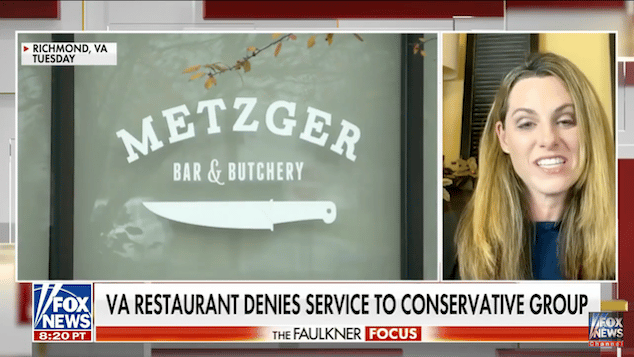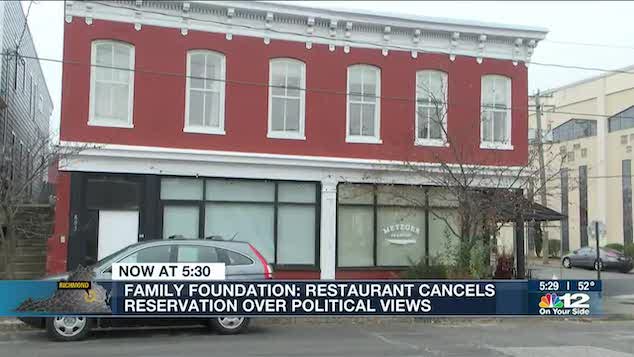

Family Foundation conservative group claim discrimination after Virginia restaurant, Metzger Bar cancels reservation after finding out group is anti gay and anti abortion.
A Christian group has claimed been discriminated on religious grounds after a Virginia restaurant at the last minute canceled their dinner reservation, citing the non-profit’s condemnation of same-sex marriage and abortion rights.
Metzger Bar and Butchery, a German-inspired eatery in Richmond, canceled the booking made by the Family Foundation two hours before the conservative group were scheduled to arrive on November 30.
The anti-LGBTQ+ group had planned to use the restaurant for a dessert reception for a party of 15-20, only for staff at the restaurant who included LGBTQ workers taking exception to the group upon finding out who the group were the Washington Post reported.
Metzger co-owner, Brittanny Anderson in defending the venue’s decision to deny the conservative group, posted on Instagram that the Family Foundation ‘seeks to deprive women and LGBTQ+ persons of their basic human rights in Virginia’.
The restaurant said it had ‘always refused service to anyone for making our staff uncomfortable or unsafe and this is the driving force behind our decision.
https://youtu.be/z-geGCZVhTo
Cancelled for being politically unpalatable?
Many of our staff are women and/or members of the LGBTQ+ community. All our staff are people with rights who deserve dignity and a safe work environment.’
It remained unclear how the presence of the group at the restaurant would have been unsafe, if not politically disagreeable.
The Family Foundation taking exception to the last minute cancellation accused the restaurant of canning their booking on account of their political beliefs.
In a blogpost titled ‘We’ve Been Canceled! Again’, the group’s president, Victoria Cobb, compared the refusal to accommodate the event to businesses refusing to serve Black customers decades ago.
‘Welcome to the 21st century, where people who likely consider themselves ‘progressives’ attempt to recreate an environment from the 1950s and early 60s, when people were denied food service due to their race,’ Cobb wrote.
Responses to the restaurant’s decision to deny the conservative group were mostly positive, as commentators responded to the restaurant’s Facebook post in which it stated denying the group on account of the party consisted of political donors to anti gay and abortion rights.
‘I’m proud of your decision. Can’t wait for my next opportunity to dine with you,’ wrote one social media user.

When can a restaurant deny service?
‘Bravo,’ wrote another.
While others took exception.
Responded one commentator, ‘I like your menu, but I won’t eat at a woke establishment again.’
While one person on another social media thread commented, ‘A business can reserve the right to refuse service anyone but expect consequences for being discriminatory……go woke go broke.’
Of note, the Civil Rights Act of 1964 explicitly prohibits restaurants from refusing service to patrons based on race, color, religion, or national origin. In other words, restaurants do not have a constitutional right to refuse service. However, this law does not protect those from discrimination based on sexual orientation.
It remained unclear if the law prohibits ‘discrimination’ on the basis of different political beliefs.

What constitutes discrimination?
Common situations where a restaurant is legitimately able to deny service would include if the establishment required a dress code, etiquette or if someone’s behavior was rowdy and disturbing other guests.
The Metzger incident is one of many incidents where establishments have refused service due to opposing views with their potential customers amid an increasingly fraught and divisive national political climate.
In 2018, the owner of a small Virginia restaurant asked then White House press secretary Sarah Huckabee Sanders to leave her establishment.
The decision was met with condemnation and protests were staged outside the Red Hen restaurant in Lexington, Virginia.
The owner later elaborated on her choice, and said many of her staff members were gay and felt hurt by Sanders’s decision to defend Trump on his desire to bar transgender people from serving in the military.
In 2018, a judge ruled that a New York City bar hadn’t discriminated when a bartender refuse service to Trump supporter wearing a MAGA hat, who had refused repeated requests to take off the hat. The judge cited state law which stated an establishment can not be compelled to serve guests if they disagree with their political affiliation.
Making recent headlines is the case of a Christian graphic artist from Colorado who objected to designing wedding websites for gay couples citing their religious rights to free expression. The dispute is now being considered by the heavily dominated conservative Supreme Court.
Lorie Smith, a Colorado-based web designer, has argued opposing same-sex marriage on religious grounds. She sued the state in 2016 seeking exemptions for a Colorado law barring discrimination on the basis of sexual orientation.
Smith, 38, claims her free speech right tops this state statute and allows her to reject request from same-sex couples.
In October, a Christian baker from Bakersfield, California won a discrimination lawsuit forcing them to bake wedding cakes for same sex couples, with a judge agreeing with the baker, arguing that they should not be forced to create something (artistic freedom) that went against their belief system. Where as had the cake already been in the front shop window and the baker denied selling it to the same sex couple, only then would it be akin to discrimination.





